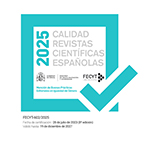Actitudes, sesgos cognitivos y sentimientos ante la desinformación a través de redes sociales
Resumen
La presente investigación tiene como objetivo profundizar en el estudio del comportamiento de los usuarios frente a las noticias falsas. Se ha realizado una encuesta (n=1350) a población de entre 18 y 80 años sobre las actitudes, los sentimientos y los sesgos cognitivos que operan en procesos de desinformación. Entre las conclusiones cabe destacar que el 89,2 % dice recibir noticias falsas. De ellos, el 25,9 % semanalmente y el 54 % declara recibirlas a través de las redes sociales, principalmente Facebook. El 41,4 % de los que alguna vez han compartido una noticia falsa confiesa haberlo hecho porque pensaba que era verdadera; el 23 %, porque estaba de acuerdo con el contenido, y un 10,1 % lo hizo porque hablaba mal de un partido político contrario al suyo. La preocupación es el sentimiento que aflora en un 66,8 % de los encuestados, seguido del 61 % que siente enfado. Sin embargo, un 38,1 % de los encuestados confiesa que las noticias falsas refuerzan lo que piensan. La investigación demuestra la prevalencia de sesgos cognitivos como el de confirmación y el de conformidad, así como la teoría de flujo en dos pasos en el proceso por el que el usuario da credibilidad a los contenidos que recibe y procede a distribuirlos.
Descargas
Descarga artículo
Licencia
La revista Estudios sobre el Mensaje Periodístico, para fomentar el intercambio global del conocimiento, facilita el acceso sin restricciones a sus contenidos desde el momento de su publicación en la presente edición electrónica, y por eso es una revista de acceso abierto. Los originales publicados en esta revista son propiedad de la Universidad Complutense de Madrid y es obligatorio citar su procedencia en cualquier reproducción total o parcial. Todos los contenidos se distribuyen bajo una licencia de uso y distribución Creative Commons Reconocimiento 4.0 (CC BY 4.0). Esta circunstancia ha de hacerse constar expresamente de esta forma cuando sea necesario. Puede consultar la versión informativa y el texto legal de la licencia.










